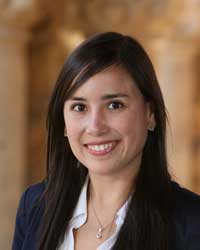
I have always felt unsettled by the dilemma that young people face early in their lives. They make decisions that will deeply impact the rest of their lives such as what to do after high school, how to afford the cost of college, and what to study in college if it is an option. I wanted to help students during their transition to college, so working in the field of education was a natural pathway for me.
Having completed a B.A. in Psychology and an M.A. in Clinical Psychology in Bogota, Colombia, I served as a school counselor and a recruitment analyst for almost two years. Afterwards, I spent one year working as a counselor for a non-profit focused on providing support to Latin American women in London.
With the desire of amplifying the impact of my work, I joined Lumni, a company that provides financial aid for low-income students in Colombia, Mexico, Peru and Chile. I spent nearly four years in Lumni developing their admission and development programs for over 2,500 low-income students from Latin America. At Lumni, I honed my skills in evaluating students’ postsecondary decisions and I gained research experience studying academic dropout factors. Additionally, in order to reach and benefit the large amount of students in all the countries where Lumni operates, I created “Lumni Academy,” an online platform that offers training workshops, mentorships and tutorships to enhance students’ soft skills, and improve their personal, academic and professional performance.
As my involvement in education practice deepened, so did my interest in education research. Being cognizant of the importance of educational choices, I took enough time to decide my next step. With the generous financial support of the Joint Japan/World Bank Scholarship Program, I found in the International Education Administration and Policy Analysis program at Stanford University the best opportunity to enhance my training in education research and to acquire a deeper understanding in the field of international education with a policy approach.
The program at Stanford allowed me to strengthen my academic skills and refine my interests through valuable courses such as International Education Policy, Applied Research Methods in Education, Economics of Education and the Education and Society Seminar. Furthermore, I enjoyed the opportunity to develop valuable quantitative research on the topic of disparities in higher education and the effects of legal reform in Colombia -particularly regarding the selection of STEM programs- under the incredible guidance of Dr. Anthony Lising Antonio.
The level of rigor and stimuli that characterizes the ICE/IEAPA program, the genuine concern of the Graduate School of Education for their students, and the opportunity to learn from so many prestigious professors, made my year at Stanford an unforgetable and invaluable experience.
Upon graduation I hope to acquire a deeper knowledge of issues related to preparation for college, postsecondary pathways, college outcomes and higher education policy. I will be pursuing these interests at the University of Illinois at Urbana-Champaign as a student in their Education Policy, Organization and Leadership Ph.D program. My experience at Stanford made me realize that this was my passion and prepared me for the next chapter in my life. Had it not been for the IEAPA Program I would not be embarking on my Ph.D next year!